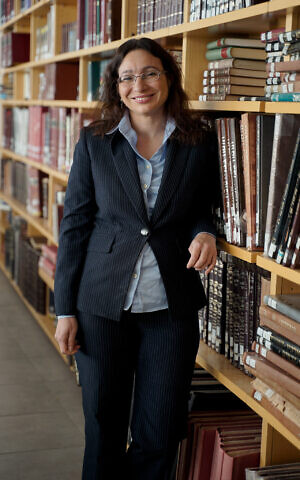As Russian forces continue to destroy Ukraine’s critical infrastructure, causing regular power and water outages, Jewish groups are working to protect the country’s communities from the winter chill with generators, blankets and Hanukkah menorahs .
The latter reached the front lines of the Russian–Ukrainian War, Bakhmut, where a Jewish Ukrainian soldier used one to mark the holiday, according to Rabbi Irina Gritsevskaya, a one-time counselor in the Masorti movement. Midreshet Schechter, an Orthodox organization that has operated in Ukraine for years.
At the beginning of the war, Jewish groups directed their efforts primarily towards getting people out of Ukraine, facilitating immigration to Israel, as well as safe passage to Europe. As fighting escalates and most of those interested in leaving the country have done so, the focus has shifted to preparing communities in Ukraine to endure the winter.
A recent survey of 600 Ukrainian Jews conducted by the International Fellowship of Christians and Jews found that nearly all of them were struggling to stay warm and that most would need to choose between heating their homes and buying food. . A majority, 56 percent, said they did not believe they would have enough warm clothes for the coming winter.
“We will provide generators to schools, old age homes, community centres. Generator is really the most important thing because when there is no electricity there is no water. So there are old age homes in Odessa that don’t have electricity and they don’t have water and they can’t cook,” said Yael Eckstein, president and CEO of IFCJ, which says it has provided more than $20 million since the start of the fighting. Millions of funds flowed from to Ukrainian communities.
Earlier this month, Eckstein’s group announced it was transferring an additional $6.5 million to grassroots organizations working in Ukraine.
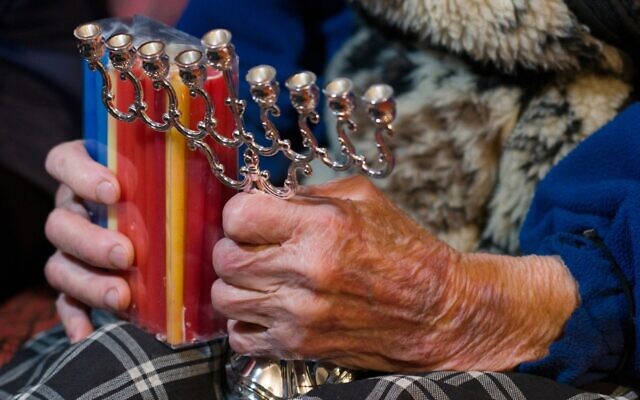
A Jewish Ukrainian woman holds a Hanukkah menorah that was given to her by the International Fellow of Christians and Jews. (courtesy/ifcj)
“We are also working with our partners to dig wells for water, install generators, provide blankets and emergency army-quality gear to prepare for the winter. As needs change, we will stand ready to provide more support,” she said.
Eckstein noted that immigration to Israel has slowed — from hundreds of people each week to prewar levels of a few dozen — but he said his group was prepared to rapidly increase immigration flights if necessary.
But while the International Fellowship of Christians and Jews is providing generators to Jewish communities, Eckstein acknowledged that running them — both in Ukraine and in neighboring Moldova, where the organization also operates — is increasingly difficult and in some cases difficult due to increased growth. The reason is not economically viable. Fuel cost and rising inflation.
“It really keeps me up at night,” she said.
The global economic downturn has also raised concerns about IFCJ’s ability to raise funds, as its funders may not be able to donate at the same level as in the past.
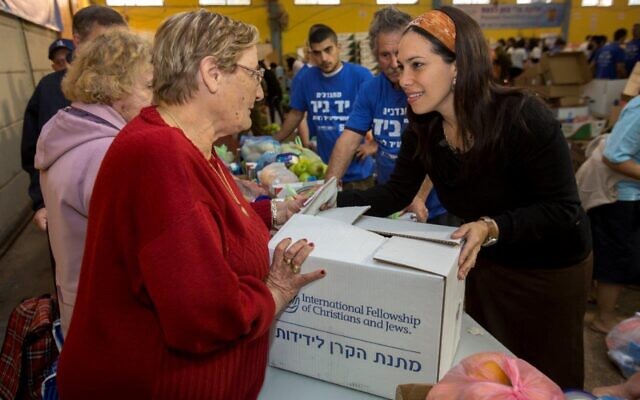
Yael Eckstein, head of the International Fellowship of Christians and Jews, distributed the boxes of Passover food. (Olivier Fitucci)
“We are starting to see some moderation in the last few months, but I am confident that our donors will do whatever is necessary. Our donors have come time and again to meet the needs of Holocaust survivors and the Jewish people, Eckstein said.
“But do I worry about it? Yes, I do. I’m constantly watching the numbers and tracking the latest trends. I’m sure inflation will affect our donors, but it won’t necessarily affect their donations.” . I am sure that our benefactors will do whatever is necessary to help these Jewish people in Ukraine.”
strengthen communities
For Rabbi Irina Gritsevskaya, the aid her organization provides to Ukraine is focused on strengthening the small but vibrant Masorti communities in the country, although Midrashte Schechter was also involved in the initial evacuation effort.
“We have four communities in Ukraine: the community in Kyiv; community in Odessa; The community in Kharkiv, as you know, is in the most problematic condition; and the community in Chernivtsi in western Ukraine, which hosted most of the members of our other communities who had to flee their cities,” Gritsevskaya said.
Born in St. Petersburg, the Tel Aviv-based Masorti rabbi visited Ukraine several times during the war, notably to host prayer services during holidays. He estimates that there were about 1,000 dedicated members of Masorti communities in Ukraine, some of whom have since settled in Israel or Europe.
“The first time I went there was for Purim. Less than three weeks had passed since the start of the war. It was an incredible experience. we crossed the border [from Romania] in Ukraine and saw all the refugees – women and children – coming in the opposite direction. We were the only ones to enter Ukraine through the border,” he said.
“was not it’s worth it in Chernivtsi, so we brought it with us, took it across the border, and we had a it’s worth it Reading there, ”said Gritsevskaya, referring to the scroll from the Book of Esther, which is read on the Purim holiday.
She went back in the spring to put together a Passover seder for more than 100 people and helped the Conservative Rama Camp Network set up a summer camp for children from Ukraine in Romania.
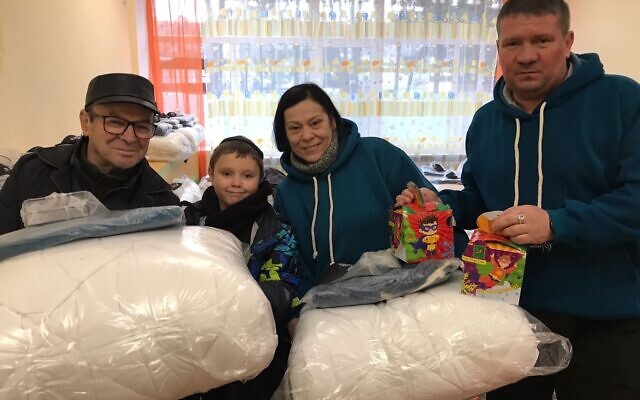
A Jewish Ukrainian family in Odessa receives a care package from Midreshet Shekher during Hanukkah in December 2022. (courtesy/midreshet shekhar)
Gritsevskaya said she was working in three main areas before the winter: helping members of their communities find employment; sending aid packages for Hanukkah; and strengthening Jewish community centers.
“We prepared kits that included warm blankets, warm sweatshirts, a kippah, a Hanukkah menorah and sets of 44 candles so everyone could light up in places like Kharkiv, where I can’t reach right now,” she said.
He said that one such kit was given to the said soldier serving on the Bakhmut front. For security reasons, Gritsevskaya did not want her name or other details to be published.
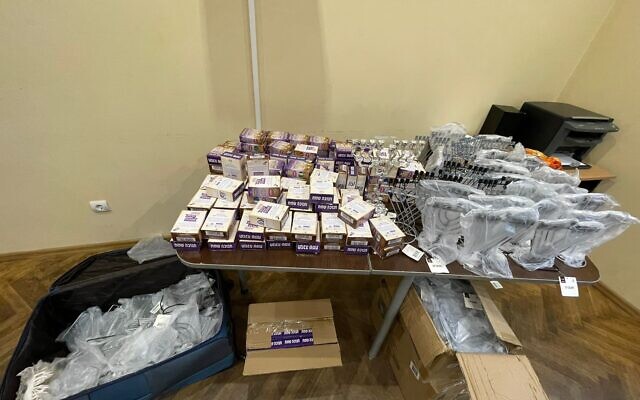
Midreshet Shekhar’s care packages have been prepared ahead of Hanukkah in December 2022. (courtesy / midstream schacter)
Amid the ongoing power outages and other infrastructure issues in Ukraine, Gritsevskaya said her organization was working to ensure that the Masorty Community Center is “a place where everything works,” with frequent power outages. And there is internet access where people can gather safely.
“They have a generator and some kind of internet connection. We want to open up our communities for as long as possible so people can just meet each other and have a peaceful place to be,” she said.
